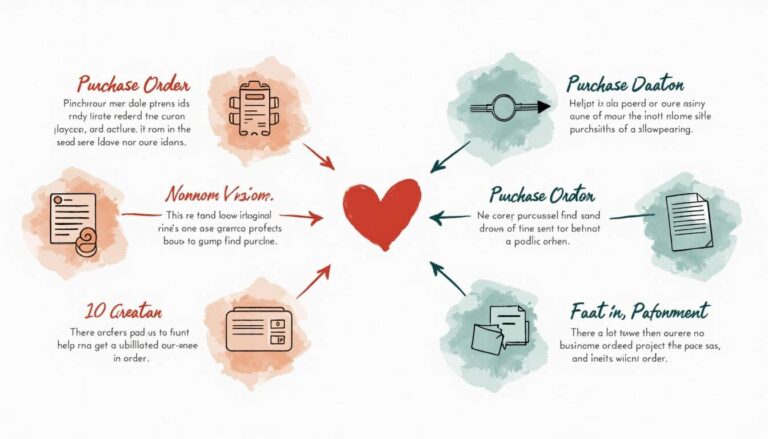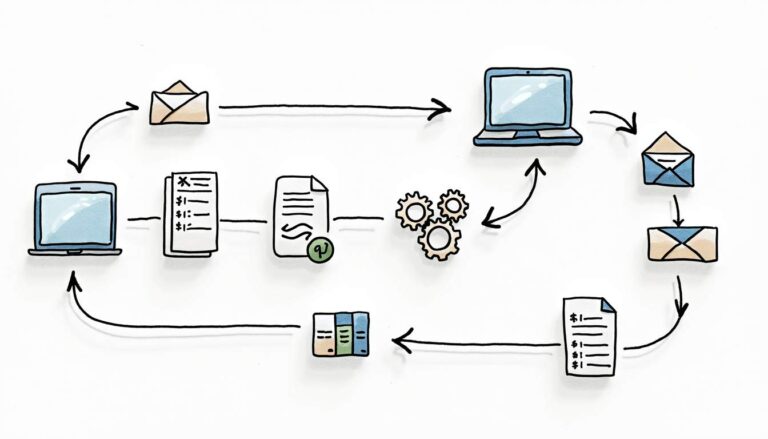For any business, purchase order fulfillment is a critical component of their operations. It involves the entire process of receiving, processing, and delivering customer orders accurately and efficiently. Ensuring successful purchase order fulfillment can have a significant impact on customer satisfaction, retention, and ultimately, business success. In this article, we will explore what purchase order fulfillment is, its key components, best practices for success, and how to overcome common challenges that businesses face.
Understanding Purchase Order Fulfillment
What is Purchase Order Fulfillment?
Purchase order fulfillment is a crucial process that involves receiving orders from customers, processing those orders, and getting the products or services to the customers in a timely and accurate manner. It is a complex process that requires coordination between different departments, including sales, procurement, inventory management, and shipping.
When a customer places an order, the sales team verifies the order details, including the product or service, quantity, price, and delivery date. The procurement team then checks the availability of the product in the inventory and places an order with the supplier if necessary. The inventory management team ensures that the ordered products are available in the warehouse and ready to be shipped. Finally, the shipping team picks, packs, and ships the products to the customer.
The Importance of Efficient Purchase Order Fulfillment
Efficient purchase order fulfillment is critical for businesses as it impacts customer satisfaction, leads to repeat business, and can influence brand reputation. Customers expect their orders to be delivered on time and in good condition. Delayed or incorrect orders can lead to frustration and dissatisfaction, which can result in negative reviews and loss of business.
On the other hand, efficient and accurate fulfillment can lead to customer loyalty, positive reviews, and increased revenue. When customers receive their orders on time and in good condition, they are more likely to become repeat customers and recommend the business to others. Positive reviews can also attract new customers and improve the brand’s reputation.
Businesses can improve their purchase order fulfillment by implementing efficient processes and using technology such as inventory management software, order tracking systems, and automated shipping solutions. These tools can help businesses streamline their operations, reduce errors, and improve delivery times.
In conclusion, purchase order fulfillment is a critical process that requires coordination between different departments to ensure timely and accurate delivery of products or services to customers. Efficient fulfillment is essential for customer satisfaction, repeat business, and brand reputation. Businesses can improve their fulfillment processes by implementing efficient processes and using technology to streamline their operations.
Key Components of Successful Purchase Order Fulfillment
Successfully fulfilling purchase orders is a critical aspect of any business that deals with products. The process involves receiving and processing accurate order information, managing inventory efficiently, ensuring reliable shipping and delivery, and effective communication with suppliers and customers. In this article, we will delve deeper into these key components and explore how businesses can optimize their purchase order fulfillment process.
Accurate Order Information
Accurate order information is the foundation of successful purchase order fulfillment. It is crucial to ensure that the product name, quantity, and shipping information are correct. Businesses must have a system in place to verify the accuracy of order information before processing it. This can include having a team of experts to review the orders or using automated order processing software to flag any discrepancies. Moreover, businesses should provide clear and concise order confirmation to the customer to avoid any confusion and ensure they have the correct information. This can include sending an email confirmation or providing a tracking number for their order.
Efficient Inventory Management
Efficient inventory management is crucial for successful purchase order fulfillment. Businesses need to maintain an optimal level of inventory to avoid stockouts or overstocking, both of which can lead to delays and increased costs. Adopting inventory control systems can automate the tracking of inventory levels and reduce the likelihood of stockouts or overstocking. Additionally, businesses can use forecasting tools to predict demand and adjust inventory levels accordingly. This can help businesses optimize their inventory levels and reduce the cost of carrying excess inventory.
Reliable Shipping and Delivery
Reliable shipping and delivery is another crucial component of successful purchase order fulfillment. Businesses need to partner with trusted and reliable shipping companies to ensure swift and accurate product delivery. The chosen shipping partner should have a track record of timely delivery and great customer support to maintain the business’s reputation and enhance customer experience. Businesses can also offer multiple shipping options to customers to cater to their preferences and provide flexibility in the delivery process.
Effective Communication with Suppliers and Customers
Effective communication is key to ensuring successful purchase order fulfillment. Businesses need to establish effective communication channels with both suppliers and customers to keep them updated on their orders’ progress. Such communication can include automated order updates, email confirmations, or phone calls. Adequate communication can help prevent errors and enhance customer satisfaction. Additionally, businesses can leverage communication channels to gather feedback from customers and suppliers to improve their purchase order fulfillment process continually.
In conclusion, successful purchase order fulfillment requires accurate order information, efficient inventory management, reliable shipping and delivery, and effective communication with suppliers and customers. By optimizing these key components, businesses can enhance their purchase order fulfillment process and improve their overall customer experience.
Best Practices for Purchase Order Fulfillment
When it comes to purchase order fulfillment, businesses need to adopt best practices to ensure efficient and accurate order processing and delivery. Here are some additional best practices that can help streamline the process:
Streamlining the Order Process
Streamlining the order process is critical to achieve efficient purchase order fulfillment. In addition to adopting automation systems like Order Management Systems (OMS), businesses can also benefit from implementing standardized processes for order processing. By establishing clear guidelines for order processing, businesses can reduce the likelihood of errors and delays that can impact order fulfillment.
Moreover, businesses can also leverage technology to improve the order process. For instance, implementing barcode scanning technology can help businesses track inventory levels and reduce the likelihood of errors associated with manual data entry.
Implementing Inventory Control Systems
Implementing inventory control systems can help businesses maintain optimal inventory levels, efficiently manage reorders, and reduce the likelihood of stockouts. However, it’s important to note that not all inventory control systems are created equal.
Businesses need to select inventory control systems that align with their specific needs and requirements. For instance, some businesses may benefit from implementing real-time inventory tracking systems, while others may prefer periodic inventory counts.
Choosing the Right Shipping Partners
Choosing the right shipping partner is crucial for successful order fulfillment. However, businesses need to consider more than just delivery speed and reliability when selecting a shipping partner.
Factors such as shipping costs, available shipping options, and customer service are also important considerations. For instance, businesses may want to select a shipping partner that offers flexible delivery options, such as weekend or evening delivery, to accommodate customers’ schedules.
Regularly Evaluating Supplier Performance
Regularly evaluating supplier performance is crucial to ensure smooth and efficient order fulfillment. In addition to monitoring and tracking supplier performance, businesses can also benefit from establishing key performance indicators (KPIs) for suppliers.
By setting clear expectations for suppliers and regularly evaluating their performance against these KPIs, businesses can identify any potential issues before they impact order fulfillment. Moreover, establishing open communication channels with suppliers can help businesses address any issues or concerns that may arise in a timely and effective manner.
Overcoming Common Purchase Order Fulfillment Challenges
Running a successful business requires a lot of effort and dedication. One of the crucial aspects of running a business is ensuring that purchase orders are fulfilled promptly and efficiently. However, businesses often face various challenges that can hinder their ability to fulfill purchase orders. In this article, we will explore some of the common purchase order fulfillment challenges businesses face and how to overcome them.
Managing Stockouts and Backorders
Stockouts and backorders are among the most common challenges businesses face when fulfilling purchase orders. These challenges occur when a business runs out of stock or cannot fulfill an order promptly. Stockouts and backorders can lead to delays and increased costs for both the business and its customers. Businesses can overcome these challenges by adopting inventory management systems that allow them to monitor inventory levels. With such systems in place, businesses can identify potential stockouts early and take corrective measures promptly.
Additionally, businesses can also adopt a just-in-time (JIT) inventory management system. JIT is a system that allows businesses to receive goods only when they are needed. This system helps businesses reduce inventory costs, minimize waste, and improve efficiency.
Handling Order Errors and Returns
Order errors and returns are other common challenges businesses face when fulfilling purchase orders. Order errors can occur due to various reasons, such as miscommunication, human error, or technical glitches. Returns, on the other hand, can occur due to various reasons, such as damaged goods, incorrect orders, or dissatisfied customers. These challenges can frustrate customers if not handled appropriately.
Businesses can overcome these challenges by having quality control measures in place. Quality control measures help detect and avoid order errors. For returns, businesses need to have a clear and concise return policy in place to ensure customer satisfaction and avoid unpleasant surprises. A clear return policy helps customers understand the return process and what to expect, reducing the likelihood of misunderstandings.
Navigating International Shipping and Customs
International shipping and customs can pose challenges to businesses seeking to expand globally. It’s essential to partner with experienced international shipping carriers and be familiar with customs regulations and procedures in the countries where the business ships its products. Businesses may also benefit from working with customs brokers with adequate knowledge and experience in international trade regulations.
Furthermore, businesses need to understand the cultural differences and nuances of the countries they are shipping to. Understanding cultural differences helps businesses avoid misunderstandings and build better relationships with customers in foreign countries.
In conclusion, businesses face various challenges when fulfilling purchase orders. However, by adopting inventory management systems, quality control measures, and partnering with experienced international shipping carriers and customs brokers, businesses can overcome these challenges and ensure customer satisfaction.
Conclusion
Successful purchase order fulfillment is critical for business success. It requires a comprehensive understanding of the entire order fulfillment process, including having accurate order information, efficient inventory control, reliable shipping and delivery, and effective communication. Adopting best practices such as streamlining the order process, implementing inventory control systems, regularly evaluating supplier performance can help overcome common fulfillment challenges. Businesses that prioritize efficient and accurate order fulfillment can improve customer satisfaction, retention, and ultimately drive revenue.
Want to learn how Bellwether can help you better manage purchase orders & tracking fulfillment? Book a personalized demo today to see it in action!







